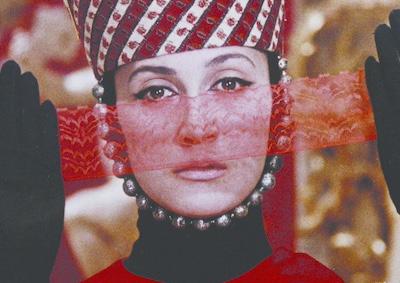Please note that this screening takes place at the Academy Museum. Tickets are available through the Academy Museum website.
“Whoever tries to imitate me is lost.” — Sergei Parajanov (1924–1990)
Considered one of the most influential and important filmmakers of the 20th century, Armenian filmmaker and poet Sergei Parajanov established himself as a paragon of visionary purity, innovation, and self-expression. Parajanov was first trained at the Moscow-based Gerasimov Institute of Cinematography (VGIK), where he developed a unique sensibility that would with time evolve beyond the socialist realist filmmaking style sanctioned by Soviet leadership. One of the many boundary-pushing, politically minded artists who would see their work censored during their lifetime, Parajanov was sentenced to hard labor in a Ukrainian prison for his outspoken disavowal of Soviet policy; there, he continued his visual artmaking practice through drawings and evocative collages. Remembered today as a thoughtful creator of ornate tableaux and a “cinematic magician” (Artland Magazine), Parajanov’s beloved film, The Color of Pomegranates, as well as the restoration world premiere of Mikhail Vartanov's poetic documentary, Parajanov: The Last Spring, will screen on the occasion of the centennial of Parajanov’s birth.
Programmed and note by K.J. Relth-Miller, Academy Museum.
Parajanov: The Last Spring
Armenia/U.S., 1992
Digital, color, in Russian, Armenian, Ukranian, Georgian and English with English subtitles, 60 min. Director: Mikhail Vartanov. Screenwriters: Martiros Vartaniants, Mikhail Vartanov. With: Sergei Parajanov, Mikhail Vartanov, Aleksandr Kaydanovskiy, Leila Alibegashvilli.
Restored by the UCLA Film & Television Archive in collaboration with the Parajanov-Vartanov Institute.
The Color of Pomegranates
Նռանգույնը, Soviet Union, 1969
Digital, color, in Armenian, Azerbaijani and Georgian with English subtitles, 78 min. Director/Screenwriter: Sergei Parajanov. With: Sofiko Chiaureli, Melkon Alekyan, Vilen Galstyan, Giorgi Gegechkori.
Restored by The Film Foundation’s World Cinema Project and the Cineteca di Bologna, in association with the National Cinema Centre of Armenia and Gosfilmofond of Russia, and funded by the Material World Charitable Foundation.






 Mobile Navigation
Mobile Navigation

